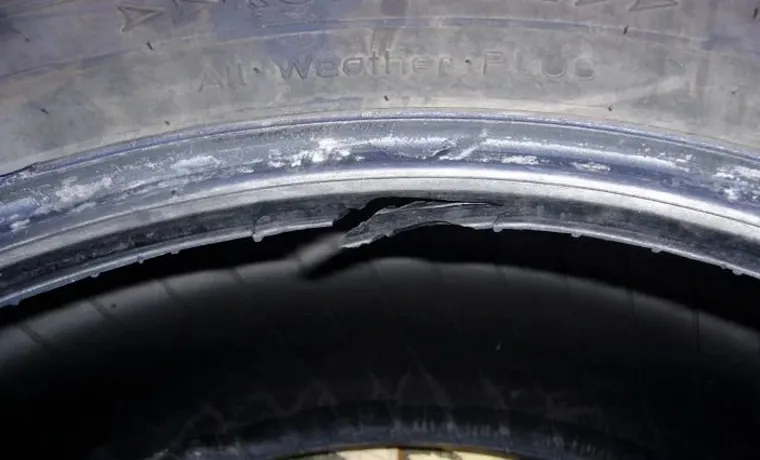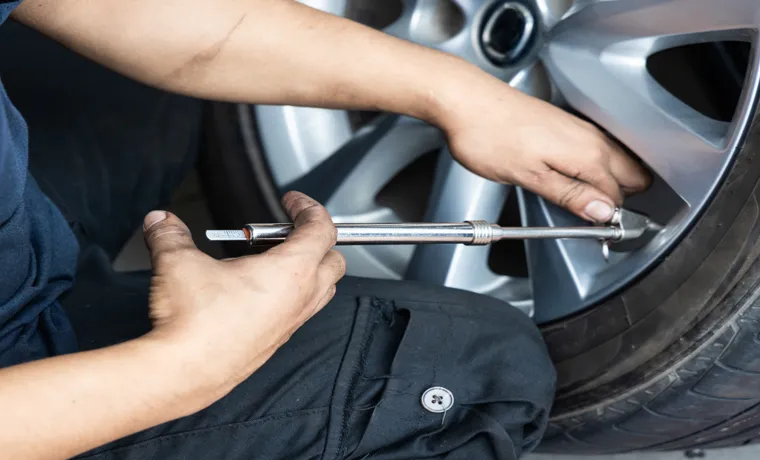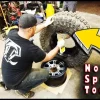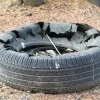Have you ever woken up to find that one of your brand new tires is losing air? It can be frustrating, especially when you’re not sure what the cause is. But don’t worry, you’re not alone. New tires losing air is a common occurrence, and there are a variety of reasons why it could be happening.
In this blog post, we’ll explore some of the most common causes of new tire deflation and provide you with solutions to get back on the road safely. Whether you’re dealing with a small puncture or a bigger issue, we’ve got you covered. So, sit back, relax, and let’s dive into the world of tire inflation.
Table of Contents
Possible Causes
If you’ve recently purchased a new tire and are finding it constantly losing air, it can be quite frustrating. But there are a few possible causes that could be contributing to this issue. One reason could be simply that the tire wasn’t properly installed, leading to a leak.
Another possible culprit is a small puncture or hole in the tire itself. Additionally, the valve stem could be damaged or improperly attached, leading to air loss. Extreme changes in temperature or pressure can also cause a new tire to lose air, as the tire may not have had time to adjust to its new environment and seating.
Whatever the cause, it’s important to address the issue as soon as possible to avoid further damage to the tire or any safety concerns on the road.
Puncture or Damage to the Tire
When it comes to tires, punctures or damages are an unfortunate reality. There are several possible reasons why a tire might get damaged, including driving on rough or rocky terrains, running over sharp objects on the road, or hitting a curb or pothole. Even normal wear and tear can lead to punctures or damage over time.
Whatever the cause, it’s crucial to address the issue as soon as possible to avoid further damage or even a blowout on the road. Regular inspections of your tires can help you detect any damages early on, and if you notice any signs of damage, such as bulges, cuts, or cracks, visit your mechanic to have them fixed or replaced. Remember, your tires are the only point of contact between you and the road, so take care of them to ensure your safety while driving.

Valve Stem Issues
Valve Stem Issues – Possible Causes Valve stem issues are a pretty common occurrence in the automotive world, and they can cause a lot of issues if not addressed in a timely manner. There are several factors that can contribute to valve stem problems, including wear and tear, poor maintenance, and manufacturer defects. One of the leading causes of valve stem issues is simply the normal wear and tear that comes with driving.
Over time, the constant movements and friction of the valve and stem can cause them to become worn down, leading to leaks and other problems. Another common cause of valve stem issues is poor maintenance. If you don’t regularly check your tire pressure or have your tires rotated, it can cause the valve stem to become corroded or damaged, making it more prone to leaks or failure.
Finally, manufacturer defects can also be a contributing factor to valve stem problems. If the valve stem or valve itself is not manufactured to proper standards, it can cause premature wear and tear, leading to issues down the road. Regardless of the cause, it’s important to address valve stem issues as soon as they arise.
Not only can they affect the performance of your vehicle, but they can also pose a safety hazard if left unchecked. So if you notice any signs of valve stem problems – such as slow leaks or uneven tire wear – it’s best to get them checked out by a qualified mechanic or tire specialist right away.
Bead Damage or Separation
Bead damage or separation can occur when using beaded jewelry, along with other types of accessories, such as bags and belts. One possible cause of bead damage is excessive force or strain applied to the piece, which can lead to cracks or breakage. Another possible cause is exposure to moisture, which can cause the beads to swell or become warped.
In addition, chemical exposure, such as exposure to perfume or cleaning products, can lead to the corrosion of metal beads or the discoloration of plastic beads. It’s important to take care when wearing and storing beaded jewelry, to avoid any unnecessary damage.
Solutions
Are you asking yourself “why does my new tire keep losing air?” Well, there are a few reasons why this may happen. One of the most common is a small puncture in the tire, which can be caused when driving over sharp objects like nails or glass. Another possibility is that the valve stem is damaged or faulty, which can cause air to slowly leak out over time.
Additionally, if you live in an area with significant temperature changes, the air pressure in your tire may fluctuate and cause it to lose air. Fortunately, there are some solutions to these issues. If you suspect a small puncture in your tire, you should take it to a professional to have it patched or replaced.
If the issue is with the valve stem, it may require valve replacement or tightening by a professional. One way to avoid tire pressure fluctuations due to temperature changes is to check your tire pressure regularly and adjust it as needed. This can be done at a gas station or with a portable tire inflator.
By addressing these issues promptly, you can avoid the inconvenience of constantly losing air in your tire. Remember, proper tire maintenance is crucial for both your safety and the longevity of your vehicle.
Taking the Tire to a Professional
If you’ve been trying to figure out why your vehicle’s tire keeps leaking air, taking it to a professional tire repair shop is your best solution. A professional tire repair technician can determine the cause of the leak and recommend a course of action to fix the problem. They can check the tire’s pressure, inspect the tire for damage, and even repair any punctures that may be causing the leak.
A major advantage of taking your tire to a pro is that they have specialized equipment that can identify any issues that may not be visible through simple visual inspection. They can also guarantee the safety of your repaired tire and ensure that it adheres to industry safety standards. Opting to take your tire to a pro will save you time, effort, and maybe even money in the long run.
So, if you’re struggling with a persistent leak, don’t hesitate to take your tire to a professional and let them take care of the problem for you.
Checking Air Pressure Regularly
Checking air pressure regularly is crucial for the safety of your vehicle and the quality of your driving experience. Low air pressure in your tires causes increased fuel consumption and can lead to premature tire wear and even blowouts. To combat this problem, it is essential to check your tire pressure regularly, ideally every month, using a tire pressure gauge.
If the air pressure is low, add some air. You should always keep your tire pressure at the recommended level listed in the owner’s manual or on the tire’s sidewall. By doing this simple routine, you can extend the life of your tires, ensure better handling, and save money in the long run.
Remember, proper tire maintenance is essential for safe driving, and checking your tire pressure is an easy and convenient way to do it. Keyword: Air Pressure
Proper Storage of Tires
Proper Storage of Tires – Solutions Taking proper care of your vehicle’s tires is essential to keep you safe on the road. One of the most crucial aspects of tire care is their storage. Tires that are not stored correctly can become damaged or even unusable.
The first solution to proper tire storage is to keep them in a dark, cool, and dry place. Sunlight and heat can shorten the lifespan of tires and cause them to crack or deform. Additionally, tires should be stored away from sources of ozone, such as generators, which can cause premature aging.
If you are storing your tires for an extended period, it is best to avoid stacking them or placing anything on top of them. This can cause the tires to distort and lose their shape. Instead, it is preferable to store them upright.
You can also invest in tire covers to protect them further. Finally, make sure to inspect your tires thoroughly before and after storage. Check for any bulges, cracks, or punctures that may have occurred during storage.
By following these solutions for proper tire storage, you can ensure that your tires remain in good condition and perform optimally when on the road.
Prevention Tips
“Why does my new tire keep losing air?” is a common question among car owners. There could be several reasons for this, such as a damaged or faulty valve stem, punctured tire, or a leaky rim. However, the good news is that there are some simple prevention tips that you can use to avoid having to deal with this situation frequently.
Firstly, it’s important to maintain the recommended tire pressure to ensure that the tires are not underinflated or overinflated, which can lead to gradual air loss. Secondly, regularly inspect the tires for any visible damages, such as cracks, bulges, or punctures, which can cause air to escape. Finally, ensure that the wheels are properly aligned, balanced, and installed by a professional to prevent any unnecessary pressure or stress on the tires, which can also cause them to lose air.
By following these simple tips, you can keep your new tires in top condition and avoid any unexpected tire blowouts on the road.
Avoiding Road Hazards
When it comes to driving, prevention is always better than cure. Avoiding road hazards requires attentiveness and caution. One of the most important things to do is to focus on the road ahead and be aware of the surroundings.
Always keep a safe distance from other vehicles and avoid sudden lane changes or turns. Additionally, be mindful of the weather conditions and adjust to them accordingly. Heavy rain, fog, or snow can significantly impair visibility and make roads more slippery and treacherous.
Make sure to maintain your car and check the condition of the tires, brakes, and lights regularly. It’s also important to avoid distractions like texting, eating, or fiddling with the radio while behind the wheel. These simple preventive measures can help minimize the risks of accidents and ensure a safe driving experience.
Remember, the road can be unpredictable at times, so don’t hesitate to take precautionary actions. Stay alert, stay safe, and avoid road hazards at all times.
Checking for Wear and Tear
When it comes to keeping your belongings in good shape, preventing wear and tear is key to maximizing their lifespan. Luckily, there are plenty of easy prevention tips that can help you avoid unnecessary damage. Start by regularly checking for any signs of wear and tear, such as frayed fabric or chipped paint.
By catching these issues early on, you can take steps to fix them before they become worse. Another great prevention tip is to clean and maintain your belongings regularly. For example, regularly cleaning your car or bike can help prevent rust and other damage.
Ultimately, taking the time to prevent wear and tear can save you money and extend the life of your belongings. So why not start today and give your possessions the care they deserve?
Conclusion
In the wise words of Benjamin Franklin, ‘An ounce of prevention is worth a pound of cure.’ When it comes to keeping your new tire from losing air, ensuring proper installation and maintenance from the start can go a long way in preventing future headaches. Don’t let a simple issue deflate your confidence – stay on top of tire pressure and you’ll be rolling smoothly in no time.
“
FAQs
How often should I check my tire pressure?
It is recommended to check your tire pressure at least once a month.
Can a damaged valve stem cause air loss in a tire?
Yes, a damaged valve stem can cause air loss in a tire.
Is it normal for a new tire to lose air?
It is not normal for a new tire to lose air, and it could indicate a manufacturing defect or a problem with the installation.
How can I find out if there is a puncture in my tire causing air loss?
You can inspect the tire for any visible punctures or take it to a tire shop for a thorough inspection.
Can extreme temperatures cause a tire to lose air?
Yes, extreme temperatures can cause changes in tire pressure and lead to air loss.
Should I replace a tire that keeps losing air?
If the tire continues to lose air despite attempts to fix it, it may need to be replaced.
How can I prevent air loss in my tires?
You can prevent air loss in your tires by keeping them properly inflated, avoiding overloading the vehicle, and checking for damage regularly.



